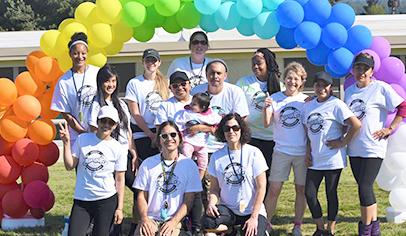1. Start on the Bottom Rung
Think of parent involvement as a ladder. Your first task is to get people to step onto that bottom rung. You want them to move from no involvement to some involvement. Once you get a parent interested and connected to the school, you can move him up to higher rungs: occasional volunteer, frequent participant, even committee chair or officer. But people rarely go from no involvement to president. They take one step at a time.
How do you get them on the ladder? You might sponsor a free family potluck picnic just before school starts. The event would encourage parents, students, and teachers to mingle in a fun, stress-free environment. No fundraising, no signup sheets, no membership recruitment; just fellowship. You could establish a welcome committee to make a personal connection with families when they move to your school. A boohoo breakfast for kindergarten moms dropping off their children on the first day of school can build rapport between the newest members of your parent community. A Dads Club is a great way to engage fathers in the school community.
2. Make Involvement Easy
If you want people to participate, it's crucial that you make it easy for them. People are just shy enough or just busy enough or just uninformed enough that the slightest obstacle to involvement can become an insurmountable barrier. Take away the predictable barriers and your group can flourish. They don't have time? Keep events short and to the point. They don't know who to call? Include names and phone numbers on every parent group correspondence. They don't know anyone? Develop a new parent mentor system, where veteran parents reach out to newcomers. They aren't sure where they'll fit in? Distribute committee descriptions. They lost the sign-up sheet? Post information in a variety of channels, repeated several times.
Thoughtfully consider what excuses or reasons people have for not getting involved in your group, then target those areas for improvement. This might require harsh scrutiny of your group's inner workings. But if you're serious about increasing parent involvement, you need to make it easy for parents to say yes.
3. Serve a Buffet
Provide lots of different ways parents can get involved. If there's a smorgasbord of choices, it's more likely that something will appeal to each person. Break big jobs into little ones so the tasks aren't overwhelming. Identify jobs that can be done at home. Differentiate between one-time projects and responsibilities that continue throughout the year. Indicate projects that require the use of a committee and those that are best handled by an individual working on her own. Describe the skills needed for each task: organizational, analytical, creative, social, technical, physical, etc. And let people know how much time they're committing to for each job. Tell them that getting involved doesn't have to involve a neverending commitment of time and energy—even an hour or two a semester helps.
4. Pop the Question
Possibly the single most effective way to increase parent involvement is to ask people personally to help. Most people have a natural desire to be helpful, but for a variety of reasons they find it difficult to take the first step. Personal contact, either a face-to-face chat or a telephone conversation, is hard to beat. It allows you to immediately counter any objections and address any concerns people express. It also sends them the message, "You, Mr. or Mrs. Parent, are so important to our school's success that I am calling you personally to encourage you to get involved." People like to be noticed, and many reciprocate that attention by saying yes.
5. Make the Call
Could this happen in your group? A parent new to the school signs her name on a couple of PTO committee lists. And then she waits for someone to call her. And waits. And waits. The event she thought she had volunteered for comes and goes, without her help. Then the questions come. "I can't believe nobody called. Did I miss some meeting? Was I supposed to contact someone? Didn't they want me to get involved? Are they just a clique?"
When people put their names on a sign-up sheet, it's important to call them. Even if it's awkward that there's only one new name on the committee, call her and introduce yourself. Even if there really, really isn't enough work to go around, call all the volunteers and thank them for signing up. Even if your committee won't be starting work for several months, call everyone right now and explain the timeline. A voice contact, even if it's on an answering machine, lets your volunteer know you have her name and she won't be ignored.
6. Talk the Talk
If you make it easy to get involved, provide lots of options, and recruit some people directly, you're well on your way to building a strong volunteer base. But you need to communicate on a broader scale, too.
Don't assume that everyone knows what your parent group does. Instead, get the word out. Start the school year by distributing an upbeat welcome packet that explains all about the parent group. Take care to thoughtfully design this important marketing tool.
Throughout the year, use many different forms of communication, including email, website, social media, backpack notes, phone calls, outdoor signs, indoor displays, even local television. Clearly articulate your message, explain why this is something your audience should pay attention to, and repeat your messages in several formats.
7. Make It Fun
Enjoyment is contagious. Most people want to be part of a group that has fun while accomplishing its goals. Be upbeat and stress the positive, even if your group is dealing with internal issues. Smile. Celebrate success. Provide refreshments at meetings and encourage mingling. Relax once in a while and just enjoy the camaraderie that comes from working together.
8. Do Fundraising Second
There is so much more to a parent group than fundraising. And yet fundraising often gets the most attention.
"Orders are due by Tuesday!"
"Prizes will be given for the top-selling classroom."
"Welcome back to school...and here's the fundraising packet."
"Sell, sell, sell!"
Posters, glossy brochures, kickoff assemblies, monthly promotions, classroom competitions, and incentive programs all put the focus on fundraising and drown out the more important message of your group's good work.
Often, the very first contact a parent has with a group is the arrival of the fall fundraising packet. Of course, you want to get your major fundraising done quickly so you have the funds to carry through the year. But when the first parent group event is outright fundraising, you run the risk of appearing to be only about money.
Consider setting aside enough funds at the end of the school year to allow your group to sponsor a family event early the following fall. Demonstrate first that you are sincere about school improvement and parent involvement, and then the inevitable fundraising appeal won't seem so desperate.
9. Roll Out the Welcome Wagon
Welcome people one-on-one at every opportunity. Go out of your way to introduce yourself. Don't assume everyone knows who you are or what your group is all about. You and the other officers are your group's best ambassadors.
Take a few minutes to learn a fact or two about each newcomer. Learn names. Use them. Ask about their children. Find out about their skills, interests, and parent group experience. Listen thoughtfully to new ideas. Delegate the good jobs, not just the busy work. Empower your committees. Use name tags at meetings so when somebody new does come, she won't feel like an outsider.
10. Be Open to Ideas
If you want newcomers to become a true part of your team, it's important to let them contribute their talents and their ideas, not just their time. Never say "We tried that; it didn't work" or "That's not the way we do it." Yes, you're the one with experience, but outsiders will view responses like this as closed-minded. People like to feel that their opinions count.
When you are confronted with the words "At my child's old school, the PTO...," drop your defenses and really listen. Write down suggestions. Brainstorm new ideas with other parents, not just your fellow officers. Survey the parent community. You could be pleasantly surprised at what your parents have to say. And if the results are less than complimentary, use the information to get the group back on track.
11. Get Organized
Sometimes parent groups get a bad rap from outsiders as being cliquish, gossipy, or even irrelevant. Your challenge is to demonstrate to the rest of the school community that your group is a legitimate, well-run organization. You want to show others that this a group to which they want to belong. How? Get organized. Write bylaws and follow them. Use basic parliamentary procedure at your meetings. Provide training for your committee chairpeople. Pass along files from year to year. Keep good financial records and report openly.
On a more personal level, avoid pettiness and cliquish behavior. Don't take criticism personally. Avoid inside jokes that leave outsiders puzzled. People will find other ways to use their time if your group projects an unfriendly attitude. On the other hand, if you promise a positive experience, sound training, and good role models, your group will attract the best your community has to offer.
12. Say Thank-You
It seems so obvious to say thanks to people who volunteer their time and talent. But often by the time the carnival has been torn down, the donor thank-you letters have been sent, or the cookie dough has been distributed, you just want to put that project behind you. There's a tendency to assume that successful completion should be satisfaction enough. After all, you've most likely heard "I don't do this to get thanked." True, some volunteers don't need special recognition to feel good about their involvement. But do it anyway. Thanking volunteers assures everyone that their time is valued and their contribution is appreciated.
Keep good records of participation so you don't forget who to thank. Thank people in a timely manner and in a personal way. Never settle for "Thanks to everyone for all your help." Send emails or notes or stop people at school and offer your thanks in person. Make sending proper thank-yous to all volunteers part of the job description for all officers and committee chairpeople. And it's OK, maybe even essential, to organize a formal volunteer appreciation event. Get past the objections that the parent group shouldn't use its resources to "thank ourselves." Celebrating the work of your volunteers builds pride, which leads to a stronger and more effective organization in the long run.
13. Enlist the Principal
The most successful parent groups forge partnerships with their principals. The principal becomes a strong advocate to help the parent group build involvement. The parent group, in turn, becomes a powerful engine to help propel the school toward its educational goals. To create this kind of success, you have to have a trusting relationship with the principal. That doesn't mean you have to agree on everything, but it means you have to find common ground. And it means you have to respect each others' roles.
Talk with the principal about goals, objectives, and roles. Enlist her aid to promote parent group activities to the students and staff members. Encourage her to speak about the tangible benefits of parent involvement. Consider making her part of your executive board, and invite her to your general meetings. Work as a team. Seeing the principal as an active partner in the PTO shows parents that the school values your organization.















